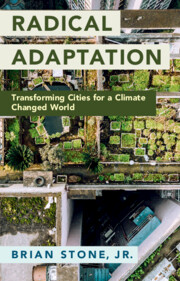
- Publisher:
- Cambridge University Press
- Online publication date:
- January 2024
- Print publication year:
- 2024
- Online ISBN:
- 9781009211192


This book considers the everyday conduits through which climate instability is revealing itself: the storm sewer drain on your street, the powerlines transporting your electricity, the mix of vegetation in your backyard or neighborhood park – these are the pathways through which climate change is most likely to impact your life. For many, these are the last places we expect it to. The first book to establish a framework for climate change adaptation, Stone's aim is to understand how climate change is altering our lives in the present period – this period of transition between the ancient, stable climate of our ancestors and the unfolding, no longer stable climate of our children – and how our cities might adapt to these changes. Stone's concern is with the risks posed by a new environmental regime for which our modes of living are ill-adapted, and with how these modes of living must be altered – radically altered – to persist in a climate changed world.
‘Radical Adaptation brings a global perspective to our engagement with the reality of climate change in everyday life. In this insightful and carefully researched book Stone explores a series of emerging intersections between climate, infrastructure, and contemporary cities.’
Matthew Gandy - University of Cambridge
‘Professor Stone has written a magnificently clear text outlining the most critical current impacts of climate change on cities (heat, drought, sea level rise, and flooding) and plausible solutions. With expert synthesis, he presents complex scientific information in understandable, jargon-less language, providing brilliant insight into current conditions, future threats, and adaptation options. This book is a must-read for anyone engaged in urban infrastructure and planning and climate adaptation and anyone interested in how climate change is altering our lives.’
Peter J. Marcotullio - Director, CUNY Center for Sustainable Cities, Hunter College
‘This book describes the many ways the climate crisis impacts on us now in our homes, neighbourhoods and livelihoods and the most effective do-able measures to address these. What makes it special is the interweaving of detailed city case studies with a general text (also detailed) and historic examples.’
David Satterthwaite - International Institute for Environment and Development and Visiting Professor, University College, London
‘Cities are in a constant state of becoming, and now climate change is forcing societies to even more dramatically reimagine how cities are built, and how people live in them. In response, Radical Adaptation provides a compelling eye-level and planning-based narrative on the pathways and possibilities that lie ahead for urban spaces and residents. As a solutions-focused book, it details the story of how positive transformative change is within our own grasp, and that the cumulative impact of small and discrete steps, even against rising challenges, can become the rebuilding that is needed to create more resilient, sustainable and equitable communities.’
William D. Solecki - Hunter College, City University of New York
‘Cities are at the forefront of climate change. Professor Stone provides a compelling account of how past infrastructure choices in cities interact with extreme weather and climate events being increasingly fueled by climate change to affect the health and well-being of residents. Focusing on high ambient temperature and water (too much or too little), Professor Stone provides interesting, illustrative, and evidence-based stories of current impacts in cities associated with changing weather patterns; and demonstrates how timely, practical, and urgent investments in re-engineering infrastructure would increase resilience to additional climate change.’
Kristie L. Ebi - University of Washington
‘In Radical Adaptation, Stone tackles head on the critical challenge of adapting our cities to climate change. His experience provides new and hopeful insights into what this transformation might look like and where our greatest opportunities lie.’
Sara Hughes - Professor, University of Michigan
 Loading metrics...
Loading metrics...
* Views captured on Cambridge Core between #date#. This data will be updated every 24 hours.
Usage data cannot currently be displayed.